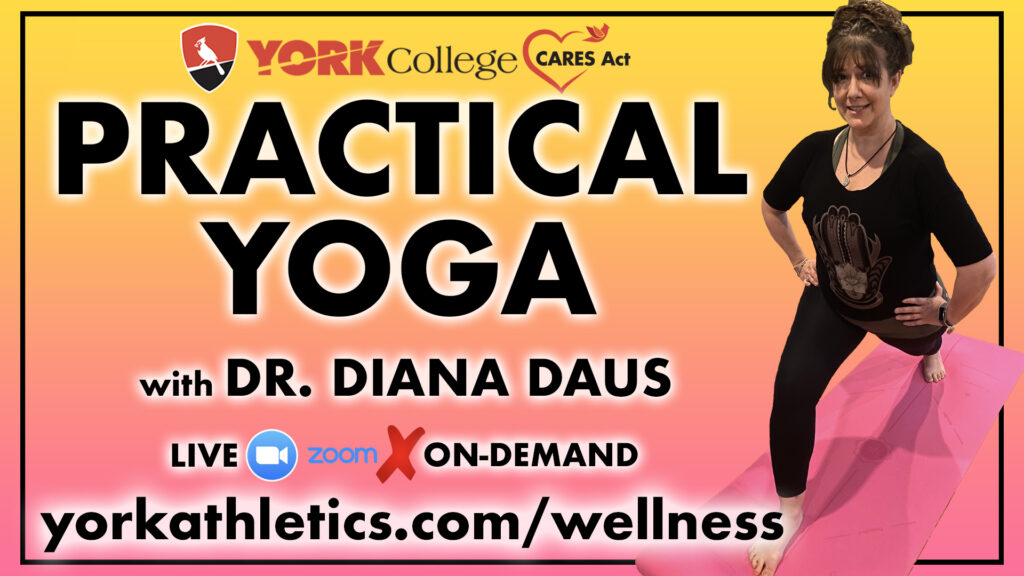Photo By |Harris Rappel
By Emiree Campbell
If you are a college student looking for a refresher from a week’s worth of learning, studying, and/or working, look no further than York College’s Practical Yoga sessions.
Practical Yoga presents live via Zoom every Monday, Tuesday, Thursday and Saturday this semester with Assistant Occupational Therapy Professor Dr. Diana Daus. The yoga program is a collaborative program offered by York College by funding from Coronavirus Aid, Relief, and Economic Security (CARES). It is an initiative by the Counseling center, the athletics department, the health sciences and student instructors.
Dr. Daus is a licensed occupational therapist since 2001 and has a long 30 year history as a group fitness instructor. Her multiple certifications include practical yoga through the Athletics and Fitness Association of America (AFAA).
“I was trained in a style of yoga called practical yoga, which is drawn mainly from Hatha Yoga. “This style combined with the tenants of occupational therapy help promote physical, mental and spiritual wellness.” said Daus.
“Hatha yoga is the more common type of yoga practiced in western cultures. It’s focus is on joint position, cuing for safety with balance and counterbalance postures. Intentions include building muscles, strength, balance, flexibility and creating greater energy and vitality to the body, mind, and spirit”.
The Zoom yoga sessions started the first week of January and there have been 24 sessions so far. All are welcomed to attend.
“I would advise all to come with an open mind, to take any variation of the pose they feel comfortable in and expect to diligently work towards improvement,” said Daus. “Yoga is a lifelong practice and it is not as easy as it seems. The art of yoga is not something that is mastered overnight.”
“Yoga takes a little bit of time and patience. Most people when they engage in yoga say they feel better and glad they did it. They notice an improvement in their flexibility, strength and how calm they are but a lot of times it’s just getting to the point of continuously practicing it regularly, that’s challenging.”
Daus says the first step of yoga, starts with acceptance. The following is to release all expectations. The moment you begin to practice gratitude, you will feel expectations start to slip away.
“My first yoga session was while I was a teenager, I was always athletic, I was always a runner,” said Daus. “Yoga has helped me stretch and help with my balance, flexibility and strength.”
Daus said practicing yoga is also beneficial to living during the time of COVID-19. “Yoga helps me a lot in my everyday life especially now that I’m living in this COVID world and working from home most of the time,” said Daus, who notes all of its different personal benefits such as posture, balance and joint pain. “Yoga helps my mental health. I’m more focused, my head is clear. It has reduced my anxiety throughout the session.”
Daus advises yoga beginners to spend time looking for what they want before partaking in a class.
“I would suggest that each person research the yoga class, look into what the class presents, is it a more spiritual or physical view, is the focus strength, balance, what is the session focused on.” If you take a class that is not your style keep searching for other yoga classes, there’s a style for everyone.”
There is no set focus or element for Daus’s yoga sessions. She allows the students to choose the focus for that given day.
“At the beginning of my yoga sessions I always ask the people in my class to set the intention of their practice, which can be to improve their flexibility, strength, it can be all of those things.”
Although there is no strict regimen, Daus still has yoga styles and routines she likes to follow.
“I enjoy teaching sun salutations in the morning and savasana meditation at the beginning or end of the sessions,” said Daus.
Sun salutations are a series of yoga poses that are performed in a continuous flowing sequence intended to improve the strength and flexibility of the muscles. According to Yoga International, Savasana meditation is the best posture for relaxation. It is known as the corpse pose and enhances the body’s innate ability to heal and rejuvenate.
“It depends on a person’s mobility range. If you have a short mobility range, yoga will be beneficial for you,” said Daus. “You don’t have to be extremely flexible to engage in yoga.You may feel more successful in poses if you’re flexible but if your less flexible yoga will still be helpful.”
There are a lot of conditions where one is not recommended to partake in practical yoga for instance those that are recovering from surgery or those that are pregnant or lastly anyone with joint issues.
“It’s very important that each participant is cleared with their physician or knows that they can engage in this activity.” said Daus.
Covid-19 has made the traditional yoga class setting nearly impossible, with Zoom being the only possible solution. However, Zoom still leaves certain challenges for Daus.
“I think it’s a little challenging to develop personal connections with students in a virtual environment,” said Daus. “But I think that encouragement to keep your cameras on or follow up with some kind of interaction at the beginning and ending of the class is helpful, as many don’t turn their cameras on and it’s disengaging.”
Dr. Daus asks that you think about what you want to gain from yoga practice and don’t consider that your asanas (postures) may not look like someone else’s. “Start where you are, with what you have.”
If you are unable to make it to the sessions, you can always catch them on-demand via the York Athletics website.


